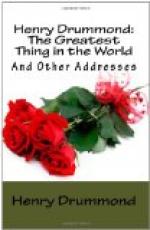The fifth ingredient is a somewhat strange one to find in this summum bonum: Courtesy. This is Love in society, Love in relation to etiquette. “Love does not behave itself unseemly.”
Politeness has been defined as love in trifles. Courtesy is said to be love in little things. And the one secret of politeness is to love.
Love cannot behave itself unseemly. You can put the most untutored persons into the highest society, and if they have a reservoir of Love in their heart they will not behave themselves unseemly. They simply cannot do it. Carlisle said of Robert Burns that there was no truer gentleman in Europe than the ploughman-poet. It was because he loved everything—the mouse, and the daisy, and all the things, great and small, that God had made. So with this simple passport he could mingle with any society, and enter courts and palaces from his little cottage on the banks of the Ayr.
You know the meaning of the word “gentleman.” It means a gentle man—a man who does things gently, with love. That is the whole art and mystery of it. The gentle man cannot in the nature of things do an ungentle, an ungentlemanly thing. The ungentle soul, the inconsiderate, unsympathetic nature, cannot do anything else. “Love doth not behave itself unseemly.”
Unselfishness. “Love seeketh not her own.” Observe: Seeketh not even that which is her own. In Britain the Englishman is devoted, and rightly, to his rights. But there come times when a man may exercise even
THE HIGHER RIGHT
of giving up his rights.
Yet Paul does not summon us to give up our rights. Love strikes much deeper. It would have us not seek them at all, ignore them, eliminate the personal element altogether from our calculations.
It is not hard to give up our rights. They are often eternal. The difficult thing is to give up ourselves. The more difficult thing still is not to seek things for ourselves at all. After we have sought them, bought them, won them, deserved them, we have taken the cream off them for ourselves already. Little cross then to give them up. But not to seek them, to look every man not on his own things, but on the things of others—that is the difficulty. “Seekest thou great things for thyself?” said the prophet; “seek them not.” Why? Because there is no greatness in things. Things cannot be great. The only greatness is unselfish love. Even self-denial in itself is nothing, is almost a mistake. Only a great purpose or a mightier love can justify the waste.
It is more difficult, I have said, not to seek our own at all than, having sought it, to give it up. I must take that back. It is only true of a partly selfish heart. Nothing is a hardship to Love, and nothing is hard. I believe that Christ’s “yoke” is easy. Christ’s yoke is just His way of taking life. And I believe it is an easier way than any other. I believe




